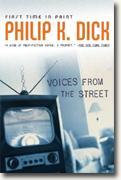Voices from the Street
Philip K. Dick
book reviews:
· general fiction
· chick lit/romance
· sci-fi/fantasy
· graphic novels
· nonfiction
· audio books
· author interviews
· children's books @
curledupkids.com
· DVD reviews @
curledupdvd.com
newsletter
win books
buy online
links
home
for authors
& publishers
for reviewers

 |
Voices from the Street Philip K. Dick Tor Paperback 304 pages November 2007 |
|
One of the earliest novels and the only one that has never been published until now, Philip K. Dick’s Voices from the Street
In his mind were forces that could destroy it; in him was the possibility, the energy to annihilate himself and his tiny universe. As before; as in all his life. It was not new; it had always been there. In one moment he could collapse every fragment of himself. That was the terror; that was what made the universe awful and foreboding.He has Jewish friends, David and Laura Gold; but, he rejects and despises them, also, thinking them to be troll-like and eternal victims. His racist attitudes extend to black people, called “Negroes,” “colored,” and the six-letter “n” word throughout, yet he seeks salvation through a charismatic Negro preacher, Theodore Beckheim. Beckheim is a Messianic type looming over Stuart’s life, reminding me somewhat of Palmer Eldritch in The Three Stigmata of Palmer Eldritch. It’s a world-view clouded by prejudice, xenophobia, and hatred - in a way, similar to ours today, in regards to racial profiling, illegal aliens and Arabic-looking people. Stuart Hadley is torn between his prejudices and the knowledge that prejudices are not right to have. On one level, the Golds are his friends; he knows that “The Golds hadn’t asked for this world anymore than he had. They had been born involuntarily.” But that doesn’t stop him from resenting them and considering their birth to be “part of some occult scheme.” He looks down on Negroes and despises them as well, but he turns to Theodore Beckheim to try to obtain a miracle and salvation. Drunk, being driven home by Marsha Frazier, the white lover of Beckheim and the creator of a journal called the Succubus - which even Hadley recognizes as being “a racist, neofascist tract,” - the very landscape transforms into Beckheim: Opening his eyes he watched a long, eroded ridge to the right of the highway. The car was moving toward it. In the corrugations of the hill he imagined Beckheim’s features: his nose and forehead, his thin lips. A portion of the ridge was Beckheim’s thick jaw and chin. Beckheim lay all around; it was a pleasant, comforting thought. Hadley could reach out his hand, through the open window, into the night, to touch Beckheim. Reach up and touch the dark, horny cheek. Run his fingers over the knobbly cheekbones, the intense ridges of the old man’s brows.Voices from the Street Originally published on Curled Up With A Good Book at www.curledup.com. © Douglas R. Cobb, 2007 |
|
|
|
 Click here to learn more about this month's sponsor! |
|
| fiction · sf/f · comic books · nonfiction · audio newsletter · free book contest · buy books online review index · links · · authors & publishers reviewers |
|
| site by ELBO Computing Resources, Inc. | |
